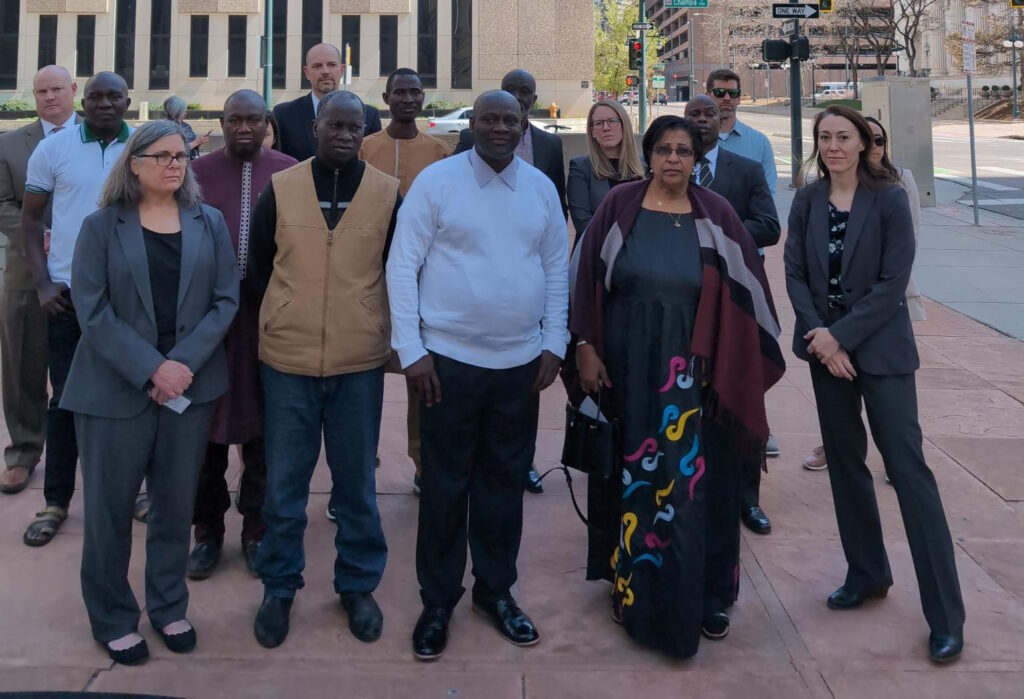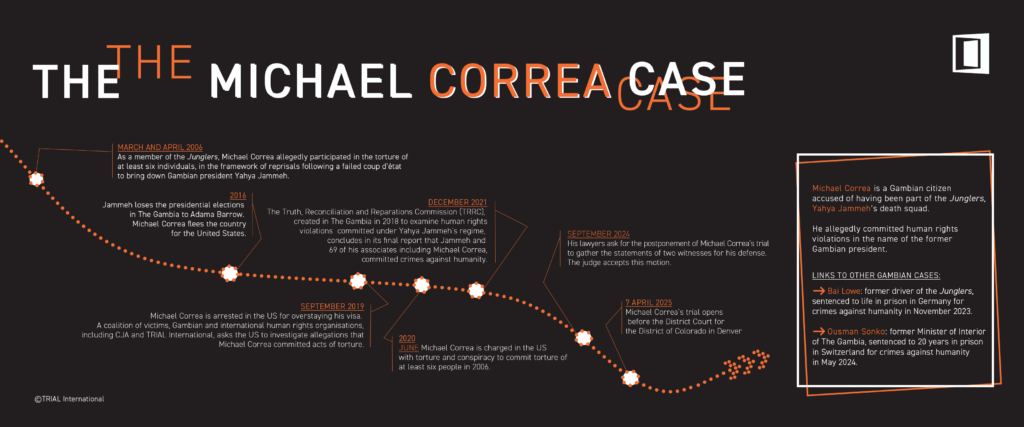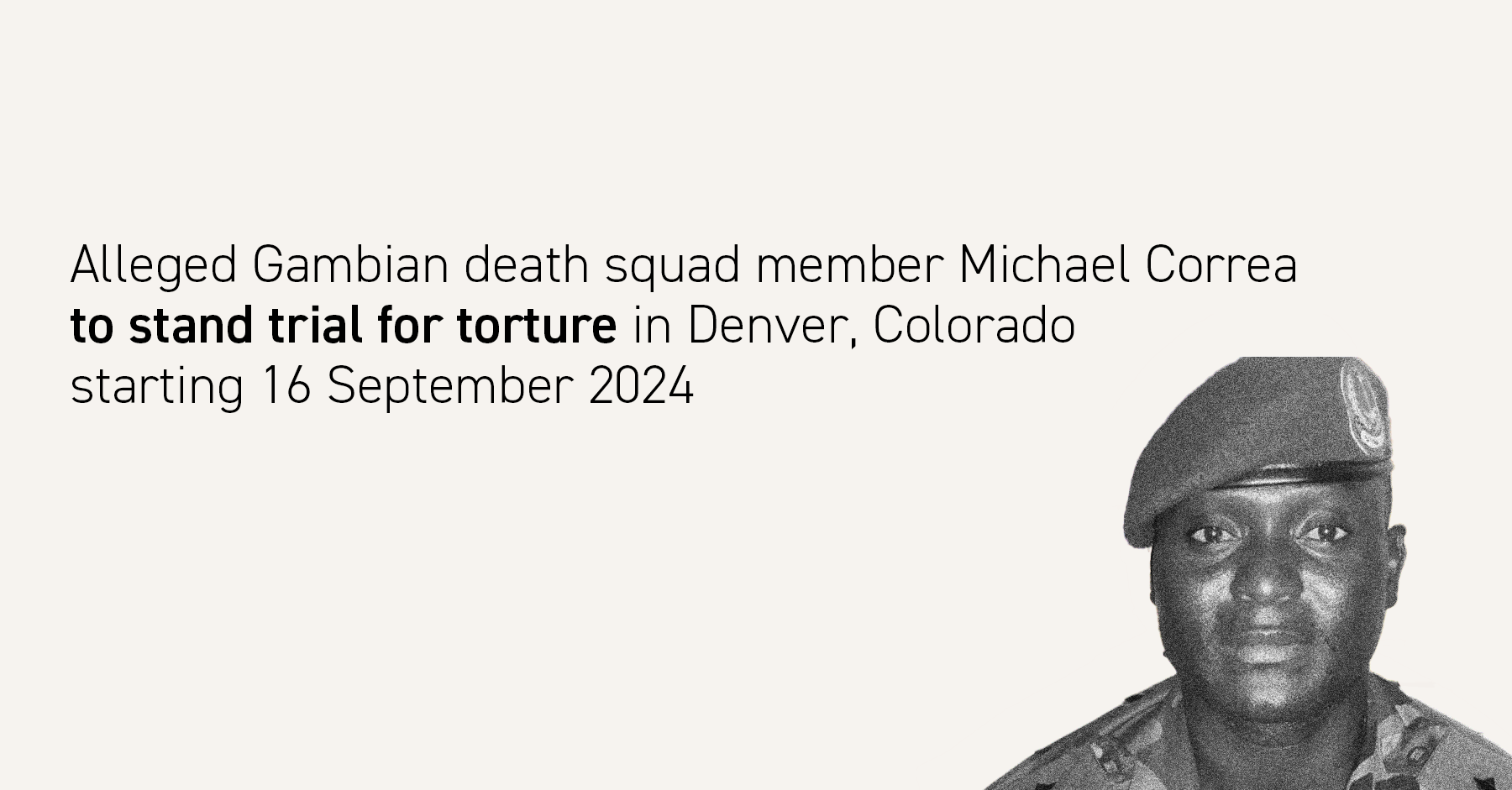Frequently asked questions and answers
1. Who is Michael Correa and what are the charges against him?
Michael Correa, a Gambian citizen, will stand trial in September 2024 for allegedly torturing people in The Gambia in 2006. He is accused of being part of the “Junglers”, a death squad that committed human rights abuses at the direction of former President Yahya Jammeh.
In 2020, the U.S. Department of Justice charged Correa with torture and conspiracy to commit the torture of at least six people. The indictment alleges that Correa and other Junglers beat their victims, put plastic bags over their heads, and used electric shocks while they were interrogated, causing victims severe pain and suffering.
2. What is the status of the case against Correa?
Correa was first arrested in September 2019 for staying in the U.S. after his visa expired and was detained in a U.S. prison. In June 2020, he was indicted for torture and conspiracy to commit torture. He remains in prison while awaiting trial.
The next step in Correa’s case is the trial for torture charges. During the trial, the jury will listen to the evidence, including witness testimony, and it will hear arguments from lawyers for the U.S. government and for Correa. Then, the jury will decide whether or not Correa is guilty.
3. When and where will Correa’s trial take place?
Correa’s trial will take place in the U.S. District Court for the District of Colorado in Denver, where Correa was initially found and arrested. The trial is scheduled to take place between September 16 to 27, 2024. While criminal trials in the U.S. are typically open to the public, a judge may grant a request to restrict public access under exceptional circumstances, such as to protect the safety of a witness.
4. How is “torture” defined under U.S. law?
Correa has been charged under the Torture Act, which allows the U.S. to prosecute individuals within its territory for acts of torture committed outside its borders. This law defines “torture” as an act committed by a public official or person acting in an official capacity that is intended to cause severe physical or mental pain or suffering to a person in the perpetrator’s control.
5. What will happen at trial?
At trial, lawyers for the prosecution and defense will present evidence and arguments to a jury. The prosecution might ask victims to testify at the trial. After hearing the evidence, the jury will decide whether it finds Correa guilty of each charge or not. For Correa to be found guilty, the jury must find that he is responsible for the acts alleged “beyond a reasonable doubt.” The jury’s decision to convict must be unanimous, meaning that all the members of the jury must vote to find Correa guilty to convict him of the charged crime. The jury could find Correa guilty on all or only some of the seven charges of torture and conspiracy to commit torture.
6. What is the jury and how is it chosen?
The jury is made up of 12 U.S. citizens who are over 18 years old, reside in Colorado, and understand English. These 12 jurors will be selected out of a pool of prospective jurors. The pool is chosen at random from members of the general public who fulfill the requirements to be jurors. Before trial, Correa’s lawyers and the prosecutors may have the opportunity to ask each prospective juror questions. During jury selection, the prosecutors and Correa’s lawyers can ask to remove prospective jurors from the pool. This process continues until the 12 jurors and their alternates are selected.
7. Will Correa be required to testify about his crimes?
Under U.S. law, criminal defendants such as Correa cannot be forced to testify. While he is not required to testify, he can choose to testify in his own defense, but if he does so, he can be cross-examined by the prosecution.
8. What role will victims and survivors play in the trial?
In the U.S., a common law country, victims and survivors do not have a role comparable to civil parties in Civil Law countries. However, the prosecutor may call some of the alleged victims to voluntarily testify as witnesses.
Under certain conditions, the Crime Victims’ Rights Act gives victims the right to timely notice about developments in the case, and the “right to be reasonably heard at any public proceeding in the district court involving release, plea, sentencing, or any parole proceeding.”
9. What happens if Correa is found guilty?
If Correa is found guilty, the court will schedule a sentencing hearing, where a judge will decide his punishment. Sentencing hearings normally happen several weeks after the jury makes its decision. At the sentencing hearing, both the prosecution and the defense will present their arguments about what the appropriate sentence should be. Victims who meet legal requisites may also have an opportunity to present statements describing how Correa’s crimes affected them.
After this information has been submitted, the judge will decide Correa’s sentence. Correa could receive a maximum sentence of 20 years in prison for each count of torture and conspiracy to commit torture. If he is found guilty of all charges pending against him, Correa could face a total of up to 140 years in prison.
10. What happens if Correa is acquitted on all the charges?
One potential outcome is that the jury will find him not guilty of any of the charges. Because Correa does not have a valid U.S. visa anymore, he could remain in immigration detention while his immigration claims are decided. He could choose to return to The Gambia, be deported to The Gambia, or be allowed to remain in the U.S.
If Correa is acquitted on all the charges and his immigration claims are decided in his favor such that he can stay in the U.S., The Gambia could seek his extradition for prosecution for other alleged crimes.
11. Will Correa have an opportunity to appeal?
Yes. If Correa is found guilty, he could appeal for three reasons:
- there was misconduct during his trial;
- the judge made a mistake in handling the case; or
- the jury engaged in misconduct or made a mistake in their verdict.
However, the prosecution cannot appeal an acquittal by the jury.
12. If Correa receives a prison sentence, could he get parole or early release?
While we cannot predict whether Correa would receive early release in general, individuals convicted of federal crimes—like those that Correa has been charged with—are not eligible for parole. However, there are a few circumstances that allow for individuals convicted of federal crimes to be released early.
First, individuals convicted with federal crimes receive credit for time that they spent in prison before their conviction. Accordingly, some of the time he has spent in detention since his arrest in 2019 may be deducted from Correa’s prison sentence. Correa would have been detained for at least five years by the time he is sentenced. The specific amount of credit Correa receives for “time served” would likely be decided when the judge announces the sentence.
Second, individuals convicted with federal crimes may have their sentences reduced by up to 15% for good behavior in prison.
Under extraordinary circumstances, individuals convicted with federal crimes sometimes qualify for compassionate release from prison. Compassionate release is rare. Some reasons for compassionate release are terminal or debilitating illness, the need to care for a child with no other guardian or incapacitated spouse, or worsening physical and mental health due to old age when the individual is over 65 years old (Correa would not be eligible for compassionate release due to old age until 2044). To qualify for compassionate release, the individual would need to show that he is no longer a danger to society.
13. Can Correa plead guilty and avoid the trial?
Yes, Correa can plead guilty at any point before or during trial. He can also try to negotiate a plea agreement with the prosecutor at any point before the jury reaches a verdict, although the prosecutor may decline to negotiate. Under a plea agreement, Correa would plead guilty in exchange for a compromise from the prosecutor, such as a shorter prison sentence than what he might have received at the end of a trial.
14. What was happening in The Gambia at the time of Correa’s alleged crimes?
During his 22-year dictatorship in The Gambia, Yahya Jammeh systemically oppressed any real or perceived opponents of his regime. The government targeted journalists; human rights defenders; lawyers; student movement leaders; religious leaders; members of the political opposition; judicial officials; members of the lesbian, gay, bisexual, and transgender (LGBT) communities; and members of the security forces. These groups suffered terrible violations, including torture, extrajudicial killings, enforced disappearances, and sexual violence.
Many of these violations came to light during Truth, Reconciliation and Reparations Commission (TRRC) hearings. The TRRC was established by the Gambian government 2018 to investigate abuses committed by the Jammeh regime. Three hundred and ninety-three (393) people, including victims, perpetrators, former government officials, and members of security forces, testified during 871 days of public hearings. The TRRC’s final report was made public on December 24, 2021, concluding that Jammeh and 69 of his associates, including Michael Correa, committed crimes against humanity. Jammeh is in exile in Equatorial Guinea, where he fled after losing the 2016 presidential election to Adama Barrow and failing at his attempt to not relinquish power despite the electoral results.
15. Who were the Junglers?
The Junglers were a death squad established by former President Jammeh in the 2000s, allegedly to suppress his regime’s opponents. The group reported directly to Jammeh and are alleged to have carried out widespread human rights violations, including enforced disappearances, torture, extrajudicial killing, sexual violence, and arbitrary detention. Some members of the Junglers have already confessed to committing torture and other serious human rights abuses.
16. Why has Correa only been charged for these acts of torture when he is also alleged to have committed other crimes?
In the U.S., prosecutors have the discretion to decide which cases they bring. In making these decisions, prosecutors consider a range of factors, including available resources and documentation. The prosecutor has not disclosed why they chose to prosecute these specific alleged acts of torture and not others.
The U.S. does not have legislation to prosecute many other crimes against humanity committed outside of its borders. This limits the type of charges that a prosecutor might bring. Correa’s case highlights the urgent need for the U.S. to pass legislation criminalizing crimes against humanity. Without this law, perpetrators who are in the United States could escape accountability for some or all of their crimes.
17. Why is Correa’s prosecution taking place in the U.S.?
The U.S. government has the legal authority to prosecute Correa for torture he allegedly committed outside of the U.S. because Correa is present in the United States. The extraterritorial Torture Act allows the U.S. to prosecute individuals found within U.S. territory, regardless of their citizenship, for torture committed outside of the country. This law operates as a form of universal jurisdiction.
This is only the third time a person has been tried under the Torture Act since the statute was passed in 1994. Two other individuals were convicted under this statute: Charles “Chuckie” Taylor, Jr., the son of former Liberian President Charles Taylor, was convicted in 2008, and Ross Roggio was convicted in May 2023. Correa is the first person who is not a U.S. citizen to stand trial under the Torture Act.
18. What is universal jurisdiction?
Universal jurisdiction is a legal principle that allows countries to prosecute crimes committed in other countries, regardless of the nationality of the suspect or victim. Universal jurisdiction cases support efforts to hold perpetrators of atrocities accountable and to bring justice to victims. They send a powerful message that human rights abusers will not find a safe haven anywhere in the world.
TRIAL International, CJA, and their partners publish the Universal Jurisdiction Annual Review (UJAR), which highlights universal jurisdiction cases in the U.S. and globally.
19. Are others being prosecuted under universal jurisdiction for crimes committed during the Jammeh era?
Michael Correa was the first person to be indicted outside of The Gambia for Jammeh-era crimes, but he is not the first to face trial. Another Jungler, Bai Lowe, was convicted in Germany and sentenced to life in prison in November 2023. Former Interior Minister Ousman Sonko was tried in Switzerland in early 2024 for crimes against humanity and was convicted and sentenced to 20 years in prison in May 2024.
20. Could Jammeh and other senior officials be prosecuted in The Gambia?
As of the publication of this FAQ document, The Gambia has only prosecuted two Jammeh-era cases, against former minister of local government Yankuba Touray and former Director-General of the National Intelligence Agency Yankuba Badjie, who was convicted alongside four other ex-intelligence officials and a doctor who was found to have facilitated the officials’ crimes by forging a death certificate.
In December 2021, the TRRC issued its final report calling for the prosecution of those responsible for Jammeh-era crimes. On May 25, 2022, the Gambian government issued a White Paper accepting the TRRC’s recommendation. On May 12, 2023, the government presented an implementation plan for the TRRC recommendations. The implementation plan proposed a Special Prosecutor’s Office to investigate cases and a “hybrid” tribunal based on a treaty with the Economic Community of West African States (ECOWAS). The court would prosecute the most serious Jammeh-era crimes. On April 23, 2024, The Gambian National Assembly passed bills establishing the Special Prosecutor’s Office and the Special Accountability Mechanism, offices which will be responsible for moving forward accountability for Jammeh-era crimes. In July 2024, the Parliament of ECOWAS decided to defer consideration of the creation of the special court until December 2024. These are promising steps forward for victims, survivors, and the rule of law in The Gambia. Given how long victims and Gambian society have been waiting, the government and ECOWAS should quickly establish the Mechanism.
21. What is the significance of this case in The Gambia and the U.S.?
In The Gambia and the U.S., Correa’s prosecution represents an important step for justice. The TRRC’s final report concluded that Jammeh and 69 of his alleged associates committed crimes against humanity and recommended that they face justice for their crimes. Correa is among the first of these individuals to face prosecution. His prosecution may allow victims to speak out about Correa’s alleged crimes and will raise awareness of the human rights violations that took place during the Jammeh regime.
In the U.S., Correa’s prosecution demonstrates the importance of universal jurisdiction, which recognizes that crimes like those allegedly committed by Correa are crimes against all people, regardless of their nationality. Universal jurisdiction proceedings like Correa’s are an important tool to ensure that alleged human rights violators from The Gambia are held accountable wherever they are found. His prosecution, and the prosecution of other alleged human rights violators, is a core part of the U.S.’s obligation to investigate and prosecute perpetrators of international crimes when they are identified on U.S. territory.
22. What role are CJA and TRIAL International playing in this case?
Victims’ groups as well as Gambian and international non-governmental organizations have been working together to hold Jammeh-era officials accountable through the “Jammeh2Justice” campaign. In September 2019, the U.S. Department of Homeland Security arrested Michael Correa for staying in the U.S. after his immigration visa expired. A coalition of Correa’s victims and human rights organizations, including CJA and TRIAL International called on the U.S. to investigate claims that Correa committed torture. This led to his indictment in 2020.
CJA and TRIAL International will continue to provide legal, psychological, and other support to victims – when needed – in preparation for, during, and after the trial. CJA and TRIAL International will also work with civil society, journalists, and impacted communities to make sure information about the trial is available through newspapers, radio, and other media.
23. What role is Gambian civil society playing in this case?
Gambian civil society has played an instrumental role in advocacy efforts related to Correa’s prosecution. Gambian organizations were a part of the coalition advocating for the U.S. to investigate claims that Correa committed torture.
Since Correa’s indictment, Gambian civil society organizations, including:
have been instrumental in raising awareness about the prosecution and in supporting victims in The Gambia.
In April 2024, alongside several other Gambian civil society organizations, these groups launched the Alliance of Victim-Led Organizations (AVLO), which is dedicated to representing the interests of victims of human rights violations in The Gambia. During Correa’s trial, AVLO will be actively involved in efforts to share information about the proceedings with victims and other interested parties in The Gambia.
24. Where can I read more about the case?
Selected court documents, including Correa’s June 2020 indictment, can be accessed online via the case docket. Additionally, CJA and TRIAL International have shared information regarding the case on their websites.



